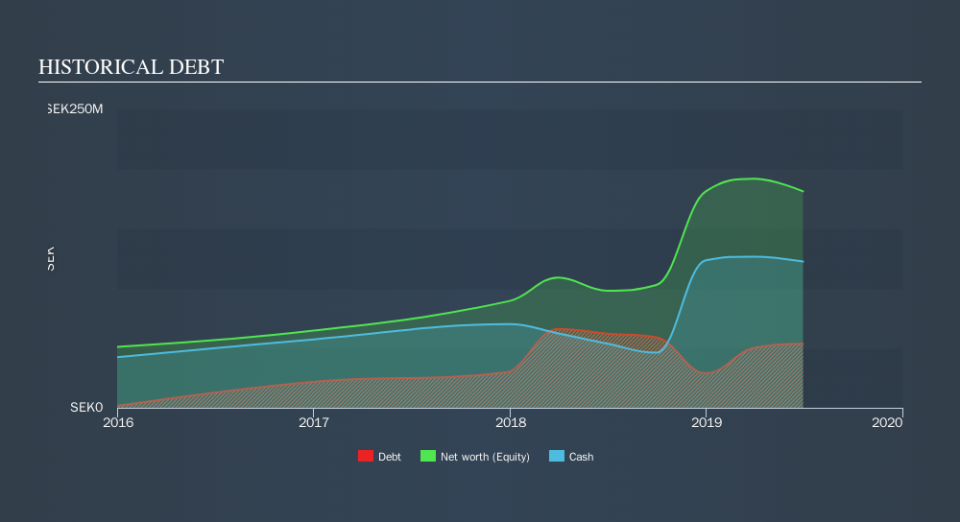CAG Group (STO:CAG) Has A Rock Solid Balance Sheet

David Iben put it well when he said, 'Volatility is not a risk we care about. What we care about is avoiding the permanent loss of capital. So it seems the smart money knows that debt - which is usually involved in bankruptcies - is a very important factor, when you assess how risky a company is. We note that CAG Group AB (publ) (STO:CAG) does have debt on its balance sheet. But the real question is whether this debt is making the company risky.
When Is Debt A Problem?
Generally speaking, debt only becomes a real problem when a company can't easily pay it off, either by raising capital or with its own cash flow. Part and parcel of capitalism is the process of 'creative destruction' where failed businesses are mercilessly liquidated by their bankers. While that is not too common, we often do see indebted companies permanently diluting shareholders because lenders force them to raise capital at a distressed price. Having said that, the most common situation is where a company manages its debt reasonably well - and to its own advantage. The first thing to do when considering how much debt a business uses is to look at its cash and debt together.
Check out our latest analysis for CAG Group
What Is CAG Group's Debt?
The image below, which you can click on for greater detail, shows that CAG Group had debt of kr53.6m at the end of June 2019, a reduction from kr62.2m over a year. But it also has kr122.5m in cash to offset that, meaning it has kr69.0m net cash.
A Look At CAG Group's Liabilities
Zooming in on the latest balance sheet data, we can see that CAG Group had liabilities of kr127.2m due within 12 months and liabilities of kr58.2m due beyond that. Offsetting this, it had kr122.5m in cash and kr97.6m in receivables that were due within 12 months. So it actually has kr34.8m more liquid assets than total liabilities.
This surplus suggests that CAG Group has a conservative balance sheet, and could probably eliminate its debt without much difficulty. Simply put, the fact that CAG Group has more cash than debt is arguably a good indication that it can manage its debt safely.
In addition to that, we're happy to report that CAG Group has boosted its EBIT by 37%, thus reducing the spectre of future debt repayments. There's no doubt that we learn most about debt from the balance sheet. But it is future earnings, more than anything, that will determine CAG Group's ability to maintain a healthy balance sheet going forward. So if you want to see what the professionals think, you might find this free report on analyst profit forecasts to be interesting.
Finally, a company can only pay off debt with cold hard cash, not accounting profits. CAG Group may have net cash on the balance sheet, but it is still interesting to look at how well the business converts its earnings before interest and tax (EBIT) to free cash flow, because that will influence both its need for, and its capacity to manage debt. Over the most recent three years, CAG Group recorded free cash flow worth 60% of its EBIT, which is around normal, given free cash flow excludes interest and tax. This cold hard cash means it can reduce its debt when it wants to.
Summing up
While it is always sensible to investigate a company's debt, in this case CAG Group has kr69.0m in net cash and a decent-looking balance sheet. And it impressed us with its EBIT growth of 37% over the last year. So is CAG Group's debt a risk? It doesn't seem so to us. Another factor that would give us confidence in CAG Group would be if insiders have been buying shares: if you're conscious of that signal too, you can find out instantly by clicking this link.
If you're interested in investing in businesses that can grow profits without the burden of debt, then check out this free list of growing businesses that have net cash on the balance sheet.
We aim to bring you long-term focused research analysis driven by fundamental data. Note that our analysis may not factor in the latest price-sensitive company announcements or qualitative material.
If you spot an error that warrants correction, please contact the editor at editorial-team@simplywallst.com. This article by Simply Wall St is general in nature. It does not constitute a recommendation to buy or sell any stock, and does not take account of your objectives, or your financial situation. Simply Wall St has no position in the stocks mentioned. Thank you for reading.


